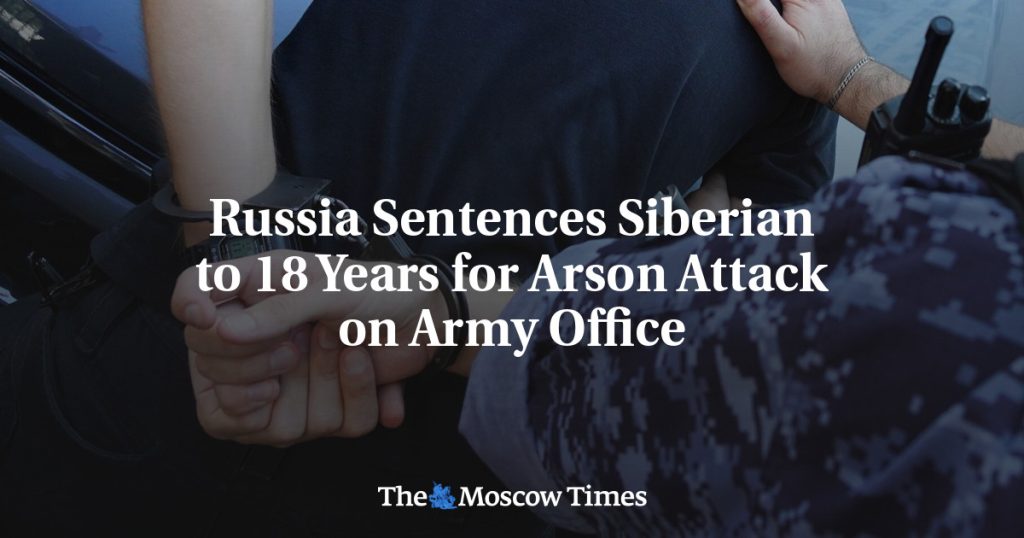In a series of court cases in Russia, a Siberian man was sentenced to 18 years in prison for planning an arson attack on an army office, while two men near Moscow were sentenced to 16 years for setting railways on fire allegedly at the behest of Ukraine. These incidents were part of a wave of arson attacks on military enlistment offices and mysterious fires on railway networks following President Vladimir Putin’s order for mobilization in 2022. The crackdown on dissent in Russia has intensified, with criticism of the military offensive in Ukraine being banned.
The 45-year-old man from the Altai region was accused of attempting to torch an army office in Barnaul in November 2023. The FSB security service claimed that he had been in contact with a banned “terrorist organization” and was preparing Molotov cocktails under the orders of a “curator.” He was arrested before he could carry out the act and was found guilty of collaborating with a foreign state, participating in a “terrorist” organization, and receiving training for “terrorist” activities. In a separate incident, two men in the Kaluga region were sentenced to 16 years for setting fire to relay cabinets on railway tracks, with accusations that they were following orders from Ukrainian security services.
In another case, a man in Feodosia in Russian-annexed Crimea was arrested on charges of spying for Ukraine. The 30-year-old was accused of taking photos of Black Sea Fleet ships and sending them to Ukrainian security services, leading to the launch of a treason case against him. Moscow has a history of opening treason cases and accusing its citizens of spying for Ukraine as part of its ongoing crackdown on dissent and perceived threats to national security. The Russian government’s actions against dissenting voices and perceived enemies of the state, including journalists and activists, have raised concerns about infringements on freedom of speech and human rights.
The sentencing of individuals to lengthy prison terms for acts of arson and alleged espionage is part of a broader pattern of repression and crackdown on dissent in Russia. The government’s ban on criticism of its military actions in Ukraine and the targeting of individuals accused of collaborating with foreign states highlight the severe consequences faced by those who oppose or challenge the state’s policies. The ongoing persecution of journalists and independent media outlets, such as The Moscow Times, adds to the climate of fear and intimidation for those seeking to report on government actions and hold those in power accountable.
Despite facing challenges and threats to their work, journalists at The Moscow Times remain committed to providing accurate and unbiased reporting on Russia. The labeling of The Moscow Times as an “undesirable” organization and a “foreign agent” by the Russian authorities is seen as an attempt to silence independent journalism and prevent the dissemination of critical information. By supporting independent media outlets such as The Moscow Times, individuals can help defend open and transparent journalism in the face of government repression and censorship. The importance of freedom of the press and the role of journalists in holding those in power accountable cannot be understated in ensuring democratic principles and values are upheld in society.
The need for support from readers and individuals who believe in the importance of independent journalism has become crucial in the face of government censorship and crackdowns on dissent in Russia. By contributing to media outlets like The Moscow Times, individuals can help ensure that accurate and unbiased information continues to be accessible to the public, despite attempts to suppress it. The challenges faced by journalists and media organizations in Russia underscore the importance of upholding the principles of free speech and press freedom, and the role of independent journalism in holding those in power accountable and promoting transparency and accountability in government actions.















